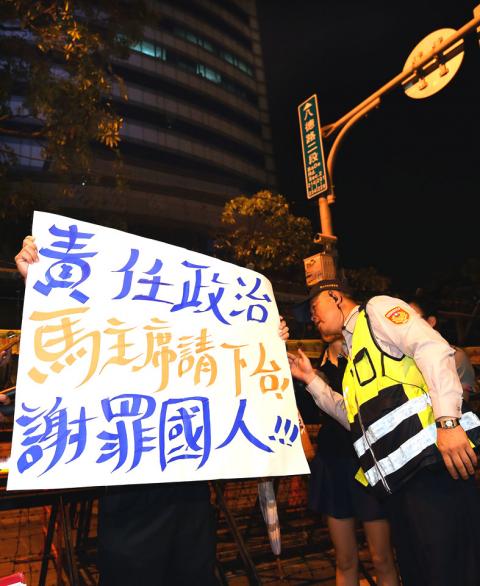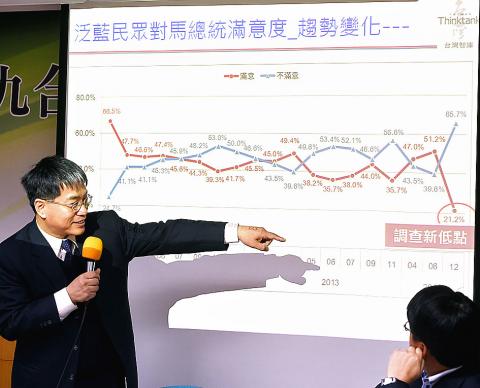One of the main reasons behind the Chinese Nationalist Party’s (KMT) disastrous defeat in the nine-in-one elections on Saturday last week is the public’s strong disapproval of President Ma Ying-jeou (馬英九) and Premier Jiang Yi-huah’s (江宜樺) performances, particularly among the younger generation, a Taiwan Thinktank survey said yesterday.
The telephone-based poll was conducted among 1,069 Taiwanese older than 20 on Sunday and Monday to gauge voting behavior in the nation’s largest-ever local elections.
The survey found that more than 74 percent of respondents are dissatisfied with Ma’s performance as president, up from 66.8 percent recorded in a similar poll conducted by the think tank in June. It also found that Ma’s approval rating sank to just 9.7 percent from 21.7 percent in June, with just 5.7 percent of people aged between 20 and 29 saying they are satisfied with Ma’s work over the past six years.

Photo: Chien Jung-fong, Taipei Times
Jiang received nearly the same approval rating from respondents in that age group — 9.8 percent — far lower than the average figure of 14.2 percent given by all those surveyed.
David Huang (黃偉峰), an assistant research fellow at Academia Sinica’s Institute of European and American Studies, said youth turnout had been about 60 percent in previous elections, but increased to 74 percent in Saturday’s polls.
“The increase is particularly meaningful when compared with the overall voter turnout of 67.5 percent. Who those extra 14 percent of young people voted for and whether they decided to participate in the election as a form of protest against the Ma administration are questions worth exploring,” Huang told a press conference held to release the poll results in Taipei.

Photo: Fang Pin-chao, Taipei Times
Huang said that while about 64 percent of the survey participants said they made up their minds about which candidate to back based on information from television news shows, the percentage of people consulting content on news and social networking sites increased.
Taiwan Thinktank deputy chief executive Lai I-chung (賴怡忠) said the elections were apparently a vote of no confidence in the Ma administration, citing the 25.1 percent of respondents who said their discontent with the central government was an important factor in their decision at polling stations.
“It is also worth noting that nearly 53 percent of those polled attribute the KMT’s defeat in the local elections to the public’s disapproval of [what are perceived as] the Ma administration’s China-leaning and corporation-centered policies, with about 51 percent saying it would take more than Ma stepping down as KMT chairman for the party to regain public support,” Lai said.
Lai said the election results also signify the end of the KMT’s traditional campaigning methods, as evidenced by the 63.5 percent of respondents who said they found ineffective the party’s threat that a victory by independent Taipei mayoral candidate Ko Wen-je (柯文哲) would destroy the Republic of China.
Nearly 64 percent of respondents said the public frenzy over Ko has made them more willing to consider voting for independent candidates in the future, the survey showed. Sixty-nine percent said the election results will be conducive to Taiwan’s democracy, while 46.4 percent think they will benefit the nation’s economy.

SECURITY: As China is ‘reshaping’ Hong Kong’s population, Taiwan must raise the eligibility threshold for applications from Hong Kongers, Chiu Chui-cheng said When Hong Kong and Macau citizens apply for residency in Taiwan, it would be under a new category that includes a “national security observation period,” Mainland Affairs Council (MAC) Minister Chiu Chui-cheng (邱垂正) said yesterday. President William Lai (賴清德) on March 13 announced 17 strategies to counter China’s aggression toward Taiwan, including incorporating national security considerations into the review process for residency applications from Hong Kong and Macau citizens. The situation in Hong Kong is constantly changing, Chiu said to media yesterday on the sidelines of the Taipei Technology Run hosted by the Taipei Neihu Technology Park Development Association. With

CARROT AND STICK: While unrelenting in its military threats, China attracted nearly 40,000 Taiwanese to over 400 business events last year Nearly 40,000 Taiwanese last year joined industry events in China, such as conferences and trade fairs, supported by the Chinese government, a study showed yesterday, as Beijing ramps up a charm offensive toward Taipei alongside military pressure. China has long taken a carrot-and-stick approach to Taiwan, threatening it with the prospect of military action while reaching out to those it believes are amenable to Beijing’s point of view. Taiwanese security officials are wary of what they see as Beijing’s influence campaigns to sway public opinion after Taipei and Beijing gradually resumed travel links halted by the COVID-19 pandemic, but the scale of

A US Marine Corps regiment equipped with Naval Strike Missiles (NSM) is set to participate in the upcoming Balikatan 25 exercise in the Luzon Strait, marking the system’s first-ever deployment in the Philippines. US and Philippine officials have separately confirmed that the Navy Marine Expeditionary Ship Interdiction System (NMESIS) — the mobile launch platform for the Naval Strike Missile — would take part in the joint exercise. The missiles are being deployed to “a strategic first island chain chokepoint” in the waters between Taiwan proper and the Philippines, US-based Naval News reported. “The Luzon Strait and Bashi Channel represent a critical access

Pope Francis is be laid to rest on Saturday after lying in state for three days in St Peter’s Basilica, where the faithful are expected to flock to pay their respects to history’s first Latin American pontiff. The cardinals met yesterday in the Vatican’s synod hall to chart the next steps before a conclave begins to choose Francis’ successor, as condolences poured in from around the world. According to current norms, the conclave must begin between May 5 and 10. The cardinals set the funeral for Saturday at 10am in St Peter’s Square, to be celebrated by the dean of the College